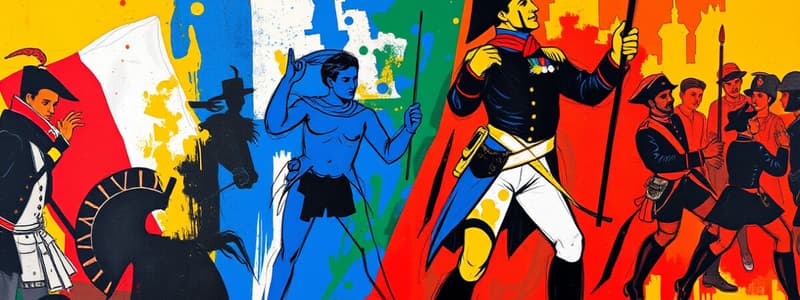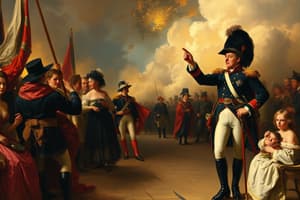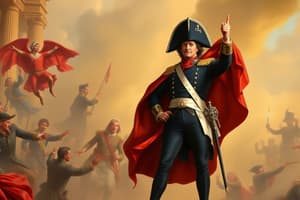Podcast
Questions and Answers
What is the essential question regarding inner healing and social healing?
What is the essential question regarding inner healing and social healing?
How do we merge inner healing with social healing, honoring both individuality and our political and economic interconnection with others?
What impact did an enlightened view of absolutism have on French society?
What impact did an enlightened view of absolutism have on French society?
Explain what impact an enlightened view of absolutism had on French Society. Describe the interconnection of social factors with economic and political causes of the French Revolution.
Name two economic systems mentioned.
Name two economic systems mentioned.
Mercantilism, Capitalism
What was the Old Regime?
What was the Old Regime?
What led to the summoning of the Estates-General in 1789?
What led to the summoning of the Estates-General in 1789?
Who was Louis XVI?
Who was Louis XVI?
What happened to Marie Antoinette?
What happened to Marie Antoinette?
What was the purpose of the National Assembly?
What was the purpose of the National Assembly?
What was the Tennis Court Oath?
What was the Tennis Court Oath?
What was the Great Fear?
What was the Great Fear?
What were the three classes of French society?
What were the three classes of French society?
What three factors led to the French Revolution?
What three factors led to the French Revolution?
What happened during the Great Fear?
What happened during the Great Fear?
Who were the émigrés?
Who were the émigrés?
What were the sans-culottes?
What were the sans-culottes?
Who was Maximilien Robespierre?
Who was Maximilien Robespierre?
What is treason?
What is treason?
What is a guillotine?
What is a guillotine?
Flashcards are hidden until you start studying
Study Notes
Essential Questions
- Merging inner healing with social healing while respecting individuality and socio-political interconnectedness is a critical idea.
Impact of Enlightenment on Society
- Enlightened views questioned absolutism and its effects on French society.
- Economic and political pressures, alongside social factors, were key drivers of the French Revolution.
Key Ideas Influencing the Revolution
- Critical ideologies included Humanism, Absolutism, Mercantilism, Capitalism, and elements of sexism and antisemitism.
The French Revolution Begins
- Marked by the collapse of the Old Regime, leading to revolutionary change.
Old Regime
- The political and social hierarchy that existed in France before the revolution, composed of three estates.
Estates-General
- Traditional assembly representing the three estates: clergy, nobility, and commoners.
- Summoned in 1789 to address the financial crisis and abuses of the Old Regime.
National Assembly
- Formed by representatives of the Third Estate, it was pivotal in demanding change and passed the Declaration of the Rights of Man in 1789.
Tennis Court Oath
- An oath taken by members of the National Assembly pledging to formulate a new constitution until their demands were met.
Great Fear
- A period of panic post-Bastille's storming, leading to widespread violence and destruction of noble properties by angry peasants.
French Society Classes
- The First Estate: Roman Catholic clergy.
- The Second Estate: Nobles.
- The Third Estate: Commoners who were dissatisfied with the existing inequality.
Driving Factors of the Revolution
- Enlightenment ideas promoting equality.
- Economic downturn exacerbated by high taxes and food shortages.
- Weak leadership of King Louis XVI and the unpopular influence of Marie Antoinette.
Formation of the National Assembly
- Established due to disputes on voting practices, aimed at representing the people's will.
Events during the Great Fear
- Destruction of noble properties and documents by peasants, along with attempts to flee by the royal family.
Revolution Brings Reform and Terror
- A significant period marked by legislative changes and rising violence.
Legislative Assembly
- A new congress with powers to create laws and sanction wars, created under the 1791 constitution.
Concepts of Treason and Émigrés
- Treason defined as betrayal against one’s country.
- Émigrés were noble refugees aiming for the restoration of the monarchy, often holding conservative views.
Radical Groups and Key Figures
- Sans-culottes were radicals demanding more representation and relief from economic hardships.
- Jacobins, led by Maximilien Robespierre, represented the extreme republican faction during the revolution.
Execution Methods
- The guillotine became the symbol of execution during the revolution, known for its use in mass executions.
Maximilien Robespierre
- A leading figure during the revolution whose radical leadership culminated in the Reign of Terror, ending with his own execution.
Studying That Suits You
Use AI to generate personalized quizzes and flashcards to suit your learning preferences.




